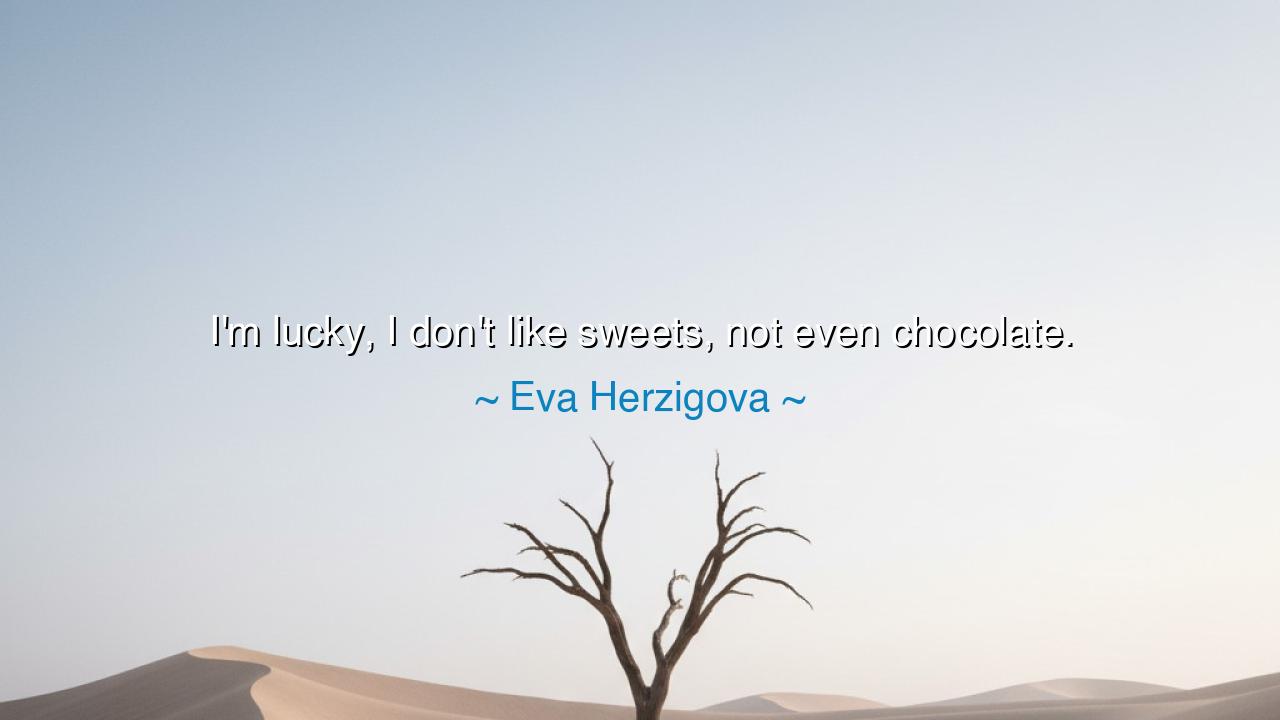
I'm lucky, I don't like sweets, not even chocolate.






When Eva Herzigová said, “I'm lucky, I don't like sweets, not even chocolate,” her words, though simple and unadorned, carry a deeper wisdom that transcends mere appetite. Beneath this modest confession lies an ancient truth about self-discipline, freedom from desire, and the quiet strength of temperance. It is not merely a remark about food, but a reflection on the human condition — on how fortune often smiles upon those who are not enslaved by longing. To not crave what others find irresistible is, indeed, a kind of blessing; for every freedom from desire is a victory over temptation, and every victory over temptation is a step toward inner peace.
Herzigová, a model long admired for her poise and self-control, speaks not with pride but with gratitude. Her “luck” is not the possession of beauty or fame, but the absence of weakness for indulgence. The sweetness she refers to — chocolate, sugar, and pleasure itself — symbolizes the countless things in life that dazzle but distract. To many, these are harmless delights; to others, they are chains, subtle yet strong. Thus, when she calls herself “lucky,” she is acknowledging a freedom that most must labor to earn — the rare state of desiring less and living more. In this way, her statement becomes a quiet hymn to moderation, that noble virtue praised by philosophers and saints alike.
The ancients called this virtue sophrosyne — the harmony of self-control and serenity. To the Greeks, it was among the highest forms of wisdom, for it meant mastery not of others, but of oneself. Socrates himself said that no man is free who is not master of his own appetites. And what are sweets, after all, but symbols of the many pleasures that call to us — easy to taste, hard to resist, and harder still to forget? Herzigová’s indifference to them is, in truth, a lesson in detachment. The one who can turn from sweetness without bitterness holds the power that kings and conquerors have often lacked — the power to govern the self.
Consider the story of Alexander the Great, who, after conquering half the known world, found himself enslaved not by enemies, but by excess. His victories brought him wine, feasts, and praise — yet the more he consumed, the emptier he became. His empire expanded, but his peace diminished. In contrast, the philosopher Diogenes, who owned nothing and desired nothing, lived in a barrel and slept beneath the sun, yet claimed to be happier than Alexander. When the conqueror offered him riches, Diogenes asked only that he “stand out of my sunlight.” The one who desires little, the ancients saw, is the one who possesses the most. Herzigová’s words carry that same quiet defiance of indulgence — a modern echo of the ancient creed: contentment is wealth.
There is also humility in her tone — a recognition that freedom from craving is often not earned, but granted by fortune. Some must struggle for years to conquer their desires; others are born untouched by them. Yet whether by discipline or by luck, the result is the same: a tranquil heart. For every craving denied without pain is a burden lifted from the soul. Herzigová’s lightness — her easy dismissal of sweets — mirrors the effortless balance that all aspire to: a state where restraint no longer feels like effort, and simplicity becomes joy.
But let us not mistake her words for disdain toward pleasure. To reject obsession is not to reject life’s sweetness. It is to know when to taste, and when to stop. The wise man does not flee from joy, but neither does he let joy enslave him. Herzigová’s example teaches us to find beauty not in indulgence, but in equilibrium — to enjoy the good things of life without bowing to them. This is the true art of living: to walk through the garden of pleasures and take only what the heart can hold without regret.
Thus, the lesson is clear: freedom lies not in having more, but in wanting less. The one who can pass by temptation with peace of mind has already won the greatest of battles. In our age of excess — of endless consumption and restless wanting — let us remember the power of contentment. Be grateful, as Herzigová is, for every desire you do not feel, and for every temptation that fails to move you. Practice moderation not as punishment, but as liberation.
For the sweetest thing in life, as the ancients would say, is not chocolate nor gold — it is self-mastery, that serene and shining joy that no sugar on earth can match.






AAdministratorAdministrator
Welcome, honored guests. Please leave a comment, we will respond soon